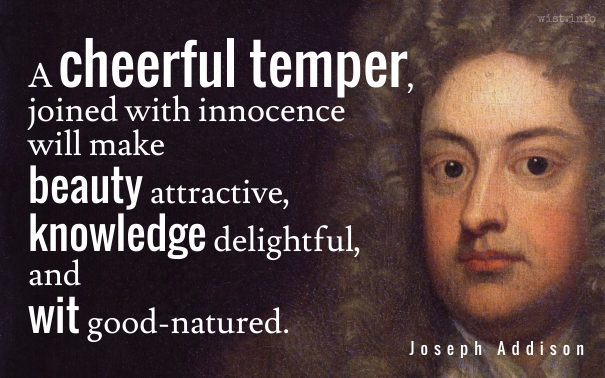Quotations by:
Addison, Joseph
When I read the epitaphs of the beautiful, every inordinate desire goes out; when I meet with the grief of parents upon a tombstone, my heart melts with compassion; when I see the tomb of the parents themselves, I consider the vanity of grieving for those whom we must quickly follow: when I see kings lying by those who deposed them, when I consider rival wits placed side by side, or the holy men that divided the world with their contests and disputes, I reflect with sorrow and astonishment on the little competitions, factions, and debates of mankind.
If men would consider not so much wherein they differ, as wherein they agree, there would be far less of uncharitableness and angry feeling in the world.
Joseph Addison (1672-1719) English essayist, poet, statesman
(Attributed)
Disputed. First attributed to "Addison" in the early 20th Century, in a paper by A. L. Evans, "Unity in Diversity," read before the Massachusetts Osteopathic Society (17 Mar 1906), and by Tryon Edwards, A Dictionary of Thoughts (1908). But this may have been a reference to another man of the same last name who was credited with publishing Interesting Anecdotes, Memoirs, Allegories, Essays, and Poetical Fragments (1794).
If you wish to succeed in life, make perseverance your bosom friend, experience your wise counselor, caution your elder brother, and hope your guardian genius.
Joseph Addison (1672-1719) English essayist, poet, statesman
(Attributed)
Broadly attributed to Addison, but possibly a 19th Century creation. The earliest found appearance is in 1854, and the earliest attribution to Addison in in 1862.
PORTIUS: ‘Tis not in mortals to command success,
But we’ll do more, Sempronius; we’ll deserve it.Joseph Addison (1672-1719) English essayist, poet, statesman
Cato, Act 1, sc. 2, l. 43ff (1713)
(Source)
This passage was widely known to America's Founders; John Adams paraphrases it in a letter to his wife Abigail (1776-02-18), and George Washington in letters to Nicholas Cooke (1775-10-29) and, most famously, Benedict Arnold (1775-12-05).
SEMPRONIUS: Oh! think what anxious moments pass between
The birth of plots, and their last fatal periods,
Oh! ’tis a dreadful interval of time,
Filled up with horror all, and big with death!
Destruction hangs on every word we speak,
On every thought, till the concluding stroke
Determines all, and closes our design.Joseph Addison (1672-1719) English essayist, poet, statesman
Cato, Act 1, sc. 3, l. 50ff (1713)
(Source)
JUBA: Beauty soon grows familiar to the lover,
Fades in his eye, and palls upon the sense.
SYPHAX: Young men soon give and soon forget affronts;
Old age is slow in both.Joseph Addison (1672-1719) English essayist, poet, statesman
Cato, Act 2, sc. 5, l. 136ff (1713)
(Source)
CATO: How beautiful is death, when earn’d by virtue!
Who would not be that youth? What pity is it
That we can die but once to serve our country!Joseph Addison (1672-1719) English essayist, poet, statesman
Cato, Act 4, sc. 4, l. 79ff (1713)
(Source)
On being presented with the corpse of his son. This line is thought to have inspired Nathan Hale.
CATO: Content thyself to be obscurely good.
When vice prevails, and impious men bear sway,
The post of honour is a private station.Joseph Addison (1672-1719) English essayist, poet, statesman
Cato, Act 4, sc. 4, l. 139ff (1713)
(Source)
CATO: The soul, secur’d in her existence, smiles
At the drawn dagger, and defies its point.Joseph Addison (1672-1719) English essayist, poet, statesman
Cato, Act 5, sc. 1, l. 124ff (1713)
(Source)
LUCIUS: Sweet are the slumbers of the virtuous man!
Joseph Addison (1672-1719) English essayist, poet, statesman
Cato, Act 5, sc. 4, l. 26 (1713)
(Source)
LUCIUS: From hence, let fierce contending nations know,
What dire effects from civil discord flow.Joseph Addison (1672-1719) English essayist, poet, statesman
Cato, Act 5, sc. 5, l. 106ff (1713)
(Source)
TINSEL: We are growing serious, and, let me tell you, that’s the very next step to being dull.
Joseph Addison (1672-1719) English essayist, poet, statesman
The Drummer, Act 4, sc. 6 (1716)
(Source)
Charity is a virtue of the heart, and not of the hands, says an old writer. Gifts and alms are the expressions, not the essence of this virtue. A man may bestow great sums on the poor and indigent without being charitable, and may be charitable when he is not able to bestow anything. Charity is therefore a habit of good will, or benevolence in the soul, which disposes us to the love, assistance, and relief of mankind, especially of those who stand in need of it.
Joseph Addison (1672-1719) English essayist, poet, statesman
The Guardian #166 (21 Sep 1713)
(Source)
A good conscience is to the Soul what health is to the body; it preserves constant ease and serenity within us; and more than countervails all the calamities and afflictions which can befall us from without.
Joseph Addison (1672-1719) English essayist, poet, statesman
The Guardian, #135 (15 Aug 1713)
(Source)
When I consider the Question, Whether there are such Persons in the World as those we call Witches? my Mind is divided between the two opposite Opinions; or rather (to speak my Thoughts freely) I believe in general that there is, and has been such a thing as Witchcraft; but at the same time can give no Credit to any Particular Instance of it.
A cloudy day, or a little sunshine, have as great an influence on the constitutions as the most real blessings or misfortunes.
Joseph Addison (1672-1719) English essayist, poet, statesman
The Spectator #162 (5 Sep 1711)
(Source)
Books are the legacies that a great genius leaves to mankind, which are delivered down from generation to generation, as presents to the posterity of those who are yet unborn.
Joseph Addison (1672-1719) English essayist, poet, statesman
The Spectator #166 (1711-09-10)
(Source)
Certain it is, that there is no kind of affection so pure and angelic as that of a father to a daughter. he beholds her, both wise and without regard to her sex. In love to our wives there is desire, to our sons there is ambition; but in that to our daughters, there is something which there are no words to describe.
Joseph Addison (1672-1719) English essayist, poet, statesman
The Spectator #449 (5 Aug 1712)
(Source)
The Fear of Death often proves Mortal, and sets People on Methods to save their Lives, which infallibly destroy them.
Joseph Addison (1672-1719) English essayist, poet, statesman
The Spectator, # 25 (29 Mar 1711)
(Source)
My friend Sir Roger heard them both upon a round trot; and after having paused some time, told them with an air of a man who would not give his judgment rashly, that “much might be said on both sides.”
Joseph Addison (1672-1719) English essayist, poet, statesman
The Spectator, #122 (20 Jul 1711)
(Source)
And that this is the Case very often, we may observe from the Behaviour of some of the most zealous for Orthodoxy, who have often great Friendships and Intimacies with vicious immoral Men, provided they do but agree with them in the same Scheme of Belief.
Joseph Addison (1672-1719) English essayist, poet, statesman
The Spectator, #185 (2 Oct 1711)
(Source)
There is nothing in which Men more deceive themselves than in what the World calls Zeal. There are so many Passions which hide themselves under it, and so many Mischiefs arising from it, that some have gone so far as to say it would have been for the Benefit of Mankind if it had never been reckoned in the Catalogue of Virtues. It is certain, where it is once Laudable and Prudential, it is an hundred times Criminal and Erroneous; nor can it be otherwise, if we consider that it operates with equal Violence in all Religions, however opposite they may be to one another, and in all the Subdivisions of each Religion in particular.
Joseph Addison (1672-1719) English essayist, poet, statesman
The Spectator, #185 (2 Oct 1711)
(Source)
We are told by some of the Jewish Rabbins, that the first Murder was occasioned by a religious Controversy; and if we had the whole History of Zeal from the Days of Cain to our own Times, we should see it filled with so many Scenes of Slaughter and Bloodshed, as would make a wise Man very careful how he suffers himself to be actuated by such a Principle, when it only regards Matters of Opinion and Speculation.
Joseph Addison (1672-1719) English essayist, poet, statesman
The Spectator, #185 (2 Oct 1711)
(Source)
A Man is glad to gain Numbers on his Side, as they serve to strengthen him in his private Opinions. Every Proselyte is like a new Argument for the Establishment of his Faith. It makes him believe that his Principles carry Conviction with them, and are the more likely to be true, when he finds they are conformable to the Reason of others, as well as to his own. And that this Temper of Mind deludes a Man very often into an Opinion of his Zeal, may appear from the common Behaviour of the Atheist, who maintains and spreads his Opinions with as much Heat as those who believe they do it only out of Passion for God’s Glory.
Joseph Addison (1672-1719) English essayist, poet, statesman
The Spectator, #185 (2 Oct 1711)
(Source)
A man must be excessively stupid, as well as uncharitable, who believes that there is no virtue but on his own side, and that there are not men as honest as himself who may differ from him in political principles.
I have always preferred cheerfulness to mirth. The latter I consider as an act, the former as an habit of mind. Mirth is short and transient, cheerfulness fixed and permanent. Those are often raised into the greatest transports of mirth who are subject to the greatest depressions of melancholy. On the contrary, cheerfulness, though it does not give the mind such an exquisite gladness, prevents us from falling into any depths of sorrow. Mirth is like a flash of lightning, that breaks through a gloom of clouds, and glitters for a moment; cheerfulness keeps up a kind of daylight in the mind, and fills it with a steady and perpetual serenity.
Joseph Addison (1672-1719) English essayist, poet, statesman
The Spectator, #381, “Cheerfulness and Mirth” (17 May 1712)
(Source)
Our disputants put me in mind of the scuttle-fish, that when he is unable to extricate himself, blackens all the water about him, till he becomes invisible.
Joseph Addison (1672-1719) English essayist, poet, statesman
The Spectator, #476 (5 Sep 1712)
(Source)
Good-nature is more agreeable in conversation than wit, and gives a certain air to the countenance which is more amiable than beauty. It shows virtue in the fairest light, takes off in some measure from the deformity of vice, and makes even folly and impertinence supportable.
Joseph Addison (1672-1719) English essayist, poet, statesman
The Spectator, No. 169 (1711-09-13)
(Source)
A cheerful temper joined with innocence will make beauty attractive, knowledge delightful and wit good-natured. It will lighten sickness, poverty and affliction, convert ignorance into an amiable simplicity, and render deformity itself agreeable.
When I read the several dates of the tombs, of some that died yesterday, and some six hundred years ago, I consider that great day when we shall all of us be contemporaries, and make our appearance together.
I love to see a Man zealous in a good Matter, and especially when his Zeal shews it self for advancing Morality, and promoting the Happiness of Mankind: But when I find the Instruments he works with are Racks and Gibbets, Gallies and Dungeons; when he imprisons Mens Persons, confiscates their Estates, ruins their Families, and burns the Body to save the Soul, I cannot stick to pronounce of such a one, that (whatever he may think of his Faith and Religion) his Faith is vain, and his Religion unprofitable.
Joseph Addison (1672-1719) English essayist, poet, statesman
Joseph Addison, The Spectator, #185 (2 Oct 1711)
(Source)



